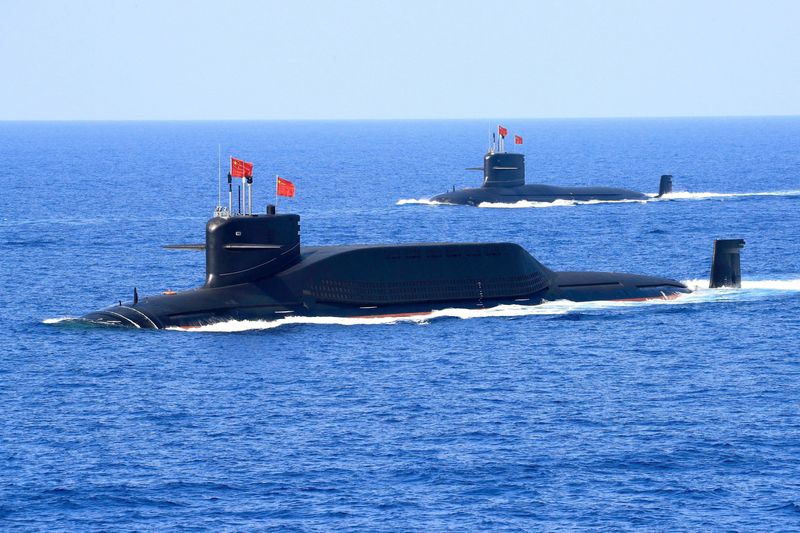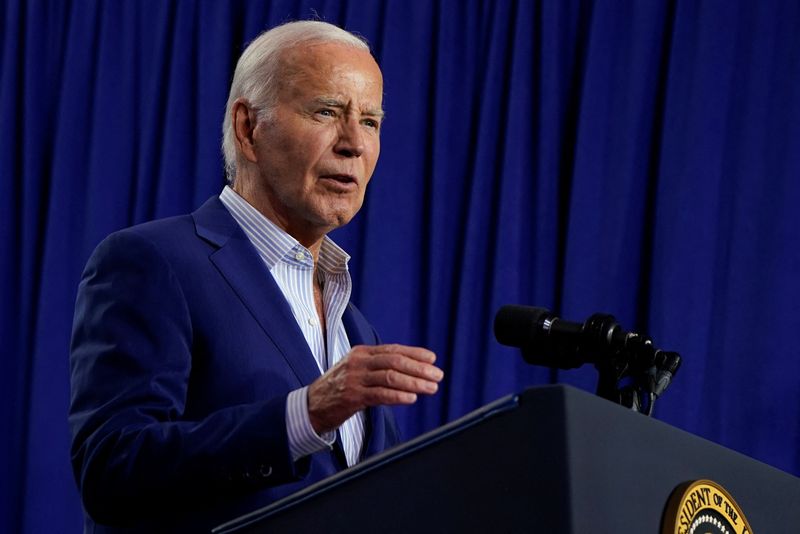Business
Exclusive-U.S. and China hold first informal nuclear talks in 5 years, eyeing Taiwan By Reuters

HONG KONG (Reuters) – The United States and China resumed semi-official nuclear arms talks in March for the first time in five years, with Beijing’s representatives telling U.S. counterparts that they would not resort to atomic threats over Taiwan, according to two American delegates who attended.
The Chinese representatives offered reassurances after their U.S. interlocutors raised concerns that China might use, or threaten to use, nuclear weapons if it faced defeat in a conflict over Taiwan. Beijing views the democratically governed island as its territory, a claim rejected by the government in Taipei.
“They told the U.S. side that they were absolutely convinced that they are able to prevail in a conventional fight over Taiwan without using nuclear weapons,” said scholar David Santoro, the U.S. organiser of the Track Two talks, the details of which are being reported by Reuters for the first time.
Participants in Track Two talks are generally former officials and academics who can speak with authority on their government’s position, even if they are not directly involved with setting it. Government-to-government negotiations are known as Track One.
Washington was represented by about half a dozen delegates, including former officials and scholars at the two-day discussions, which took place in a Shanghai hotel conference room.
Beijing sent a delegation of scholars and analysts, which included several former People’s Liberation Army officers.
A State Department spokesperson said in response to Reuters’ questions that Track Two talks could be “beneficial”. The department did not participate in the March meeting though it was aware of it, the spokesperson said.
Such discussions cannot replace formal negotiations “that require participants to speak authoritatively on issues that are often highly compartmentalized within (Chinese) government circles,” the spokesperson said.
Members of the Chinese delegation and Beijing’s defence ministry did not respond to requests for comment.
The informal discussions between the nuclear-armed powers took place with the U.S. and China at odds over major economic and geopolitical issues, with leaders in Washington and Beijing accusing each other of dealing in bad faith.
The two countries briefly resumed Track One talks over nuclear arms in November but those negotiations have since stalled, with a top U.S. official publicly expressing frustration at China’s responsiveness.
The Pentagon, which estimates that Beijing’s nuclear arsenal increased by more than 20% between 2021 and 2023, said in October that China “would also consider nuclear use to restore deterrence if a conventional military defeat in Taiwan” threatened CCP rule.
China has never renounced the use of force to bring Taiwan under its control and has over the past four years stepped up military activity around the island.
The Track Two talks are part of a two-decade nuclear weapons and posture dialogue that stalled after the Trump administration pulled funding in 2019.
After the COVID-19 pandemic, semi-official discussions resumed on broader security and energy issues, but only the Shanghai meeting dealt in detail with nuclear weapons and posture.
Santoro, who runs the Hawaii-based Pacific Forum think-tank, described “frustrations” on both sides during the latest discussions but said the two delegations saw reason to continue talking. More discussions were being planned in 2025, he said.
Nuclear policy analyst William Alberque of the Henry Stimson Centre think-tank, who was not involved in the March discussions, said the Track Two negotiations were useful at a time of glacial U.S.-Chinese relations.
“It’s important to continue talking with China with absolutely no expectations,” he said, when nuclear arms are at issue.
NO FIRST-USE?
The U.S. Department of Defense estimated last year that Beijing has 500 operational nuclear warheads and will probably field more than 1,000 by 2030.
That compares to 1,770 and 1,710 operational warheads deployed by the U.S. and Russia respectively. The Pentagon said that by 2030, much of Beijing’s weapons will likely be held at higher readiness levels.
Since 2020, China has also modernised its arsenal, starting production of its next-generation ballistic missile submarine, testing hypersonic glide vehicle warheads and conducting regular nuclear-armed sea patrols.
Weapons on land, in the air and at sea give China the “nuclear triad” – a hallmark of a major nuclear power.
A key point the U.S. side wanted to discuss, according to Santoro, was whether China still stood by its no-first-use and minimal deterrence policies, which date from the creation of its first nuclear bomb in the early 1960s.
Minimal deterrence refers to having just enough atomic weapons to dissuade adversaries.
China is also one of two nuclear powers – the other being India – to have pledged not to initiate a nuclear exchange. Chinese military analysts have speculated that the no-first-use policy is conditional – and that nuclear arms could be used against Taiwan’s allies – but it remains Beijing’s stated stance.
Santoro said the Chinese delegates told U.S. representatives that Beijing maintained these policies and that “‘we are not interested in reaching nuclear parity with you, let alone superiority.'”
“‘Nothing has changed, business as usual, you guys are exaggerating’,” Santoro said in summarising Beijing’s position.
His description of the discussions was corroborated by fellow U.S. delegate Lyle Morris, a security scholar at the Asia Society Policy Institute.
A report on the discussions is being prepared for U.S. government but would not be made public, Santoro said.
‘RISK AND OPACITY’
Top U.S. arms control official Bonnie Jenkins told Congress in May that China had not responded to nuclear-weapons risk reduction proposals that Washington raised during last year’s formal talks.
China has yet to agree to further government-to-government meetings.
Bejing’s “refusal to substantively engage” in discussions over its nuclear build-up raises questions around its “already ambiguous stated “no-first-use” policy and its nuclear doctrine more broadly,” the State Department spokesperson told Reuters.
China’s Track Two delegation did not discuss specifics about Beijing’s modernisation effort, Santoro and Morris said.
Alberque of the Henry Stimson Centre said that China relied heavily on “risk and opacity” to mitigate U.S. nuclear superiority and there was “no imperative” for Beijing to have constructive discussions.
China’s expanded arsenal – which includes anti-ship cruise missiles, bombers, intercontinental ballistic missiles and submarines – exceeded the needs of a state with a minimal deterrence and no-first-use policy, Alberque said.
Chinese talking points revolved around the “survivability” of Beijing’s nuclear weapons if it suffered a first strike, said Morris.
The U.S. delegates said the Chinese described their efforts as a deterrence-based modernisation programme to cope with developments such as improved U.S. missile defences, better surveillance capabilities, and strengthened alliances.
The U.S., Britain and Australia last year signed a deal to share nuclear submarine technology and develop a new class of boats, while Washington is now working with Seoul to coordinate responses to a potential atomic attack.

Washington’s policy on nuclear weapons includes the possibility of using them if deterrence fails, though the Pentagon says it would only consider that in extreme circumstances. It did not provide specifics.
One Chinese delegate “pointed to studies that said Chinese nuclear weapons were still vulnerable to U.S. strikes – their second-strike capability was not enough”, said Morris.
Business
UK polls point to a big Labour win. The party fears voter complacency

Labour leader Keir Starmer poses for photos as he visits the Vale Inn on June 27, 2024 in Macclesfield, United Kingdom. In the final week of campaigning, Labour outlined its plans to expand opportunities for young people.
Cameron Smith | Getty Images News | Getty Images
LONDON — There’s been one main narrative since the U.K.’s Conservative Prime Minister Rishi Sunak called a general election back in May — that the opposing Labour Party would win the vote with a landslide.
While voter polls may have differed in scale and methodology, the results have pointed in one direction, showing that the center-left Labour Party has around a 20-point lead on the Conservatives. Labour is on track to win around 40% of the vote while roughly 20% of the support is projected to go to the Tories, according to a Sky News poll tracker.
Reform UK, led by arch-Brexiteer Nigel Farage, is seen with 16% of the vote, after eating away at Tory support, while the Liberal Democrats are seen gaining around 11% and the Greens with 6%. The Scottish National Party is predicted to win 2.9% of the vote.
Labour candidates and leader Keir Starmer have been keen to play down the level of support that the party enjoys, fearing voter complacency and the appearance of “having it in the bag” — a stance that could prompt voter apathy and a lower turnout of supporters at the polls, or a backlash from Conservative-inclined sections of the electorate.
“The Labour Party wants to be able to be convince voters that it’s absolutely central that they turn out and vote, because otherwise the Tories will win, and the Tories are desperate for people to think that they have still got a chance, and therefore it’s worth turning up,” Britain’s top polling expert John Curtice told CNBC.
Question marks have risen in the past over the accuracy of British voter polls, with previous projections over or underestimating support for various political parties. The errors have often come about because of inadequate sampling or of factors that are harder to control, such as voters being “shy” when polled on which party they intended to support.
Labour Party leader Sir Keir Starmer speaks ahead of the U.K.’s general election on July 4, 2024.
Anthony Devlin | Getty Images News | Getty Images
This year, however, experts tend to agree that the polls show such a swing to Labour that, even if the scale of support were wrong, the overall result would be the same: a convincing win for the opposition party.
“My attitude is [that] a poll should be taken but not inhaled,” Curtice said wryly. “The point is, you shouldn’t be looking at them to provide you with pinpoint accuracy, they should give you a reasonable indication of the direction of travel.”
“It just so happens that because this is an election in which apparently one party is so far ahead, much as [it was] in 1997, the polls could be quite a bit out — but nobody will notice,” he noted, referencing the year when the Labour Party won a landslide against the Conservatives, ending the latter party’s then 18-year rule.
Labour ‘spin’?
The Labour Party itself is understandably keen to downplay the polls, with a spokesperson telling CNBC that the party doesn’t comment on projections, “as they vary and fluctuate.”
“Instead, we’re working hard to take our message of change to voters ahead of the only poll that matters, on 4 July,” the spokesperson stated.
On Monday, Keir Starmer said no vote should be taken for granted, asking his supporters to continue campaigning until polls closed on Thursday.
“The fight for change is for you, but change will only happen if you vote for it. That is the message we have to take to every doorstep these last few hours and days until 10 o’clock on Thursday night.”
“Nothing must be taken for granted, every vote has to be earned. The polls don’t predict the future, we have to get out there,” he told campaign supporters in Hitchin.
Labour leader Sir Keir Starmer during a visit to Hitchin, Hertfordshire, while on the General Election campaign trail. Picture date: Monday July 1, 2024.
Stefan Rousseau – Pa Images | Pa Images | Getty Images
Labour’s former campaign and communications directors, Alastair Campbell, one of the chief strategists behind the rebranding of the party in the 1990s as ‘New Labour’ ahead of its monumental election win in 1997, told CNBC that he doubts current voter polls.
“I get really worried about about the way that these election debates are now unfolding, virtually everything in the debate at the moment is about these opinion polls,” he told CNBC two weeks ago.
“Apart from a few postal votes, nobody’s voted yet. And I just do not for one second believe that the Conservatives are going to get virtually wiped out, I just don’t believe it,” he said.
“I just think there’s something going very, very wrong with these polls, I could be completely wrong, and it’s true that Labour have been consistently ahead. But I just wish that, in our election periods, we would talk less about polls and more about what the parties are saying.”

Polling expert Matt Beech, director of the Centre for British Politics at the University of Hull, said Campbell’s position was designed to persuade Labour-inclined voters to cast their ballots.
“They want to make sure that they get as big a majority as possible. They’re all very much aware of [the lead-up to the election in] 1992 with the phenomenon of ‘shy Tories,’ when the polls said Labour would win and they didn’t …. [But] they’re not actually that genuinely worried about that. What they want to have a 1997-like landslide tsunami,” Beech told CNBC.
He added, “So if you keep banging on that drum [that the polls are not correct], you’re going to say to Labour-inclined voters, ‘please go out and vote.’ But it’s not that ‘we’re actually scared we’re not going to win, we are going to win comfortably. But we want a majority that enables us to push our agenda and we want this win to mean that we’re there for two terms.’“
Business
Ad-supported Murdoch Netflix rival to launch in the UK

Rupert Murdoch’s Fox Corporation is entering the UK’s highly competitive free, ad-supported video streaming market.
Tubi will compete with the likes of Netflix, Disney+, ITVX, Channel 4’s streaming platform as well as the BBC iPlayer.
The platform has been quickly gaining market share in the US where, according to Fox, it has almost 80 million monthly active users.
In the UK, Tubi says it will offer more than 20,000 films and TV series, including content from Disney, Lionsgate, NBCUniversal and Sony Pictures Entertainment.
The platform will also include a selection of British, Indian and Nigerian content.
UK viewers will be able to access content on the Tubi webpage and via a smartphone app.
Fox Corporation bought Tubi in 2020 for $440m (£348m) as the US media giant looked to attract younger audiences.
In recent years, streaming companies like Netflix, Amazon Prime Video and Disney+ have launched ad-supported services and raised subscription prices as they tried to boost revenues.
The moves came as they faced pressure to spend more money to grow their libraries of content as they try to attract more customers in an increasingly competitive market.
In March, Mr Murdoch’s TalkTV network announced that it would stop broadcasting as a terrestrial television channel and became a strictly online service.
The network launched in 2022 but struggled to attract viewers on its linear platform.
Mr Murdoch had hoped the network would shake up the broadcasting establishment by offering an opinion-led alternative to established outlets.
The media tycoon played a pivotal role in the development of the UK’s broadcasting industry by launching Sky in 1984.
Some commentators saw TalkTV as an attempt by Mr Murdoch to recreate his success with Sky.
Mr Murdoch’s 21st Century Fox sold its 39% stake in Sky to NBCUniversal’s owner Comcast in 2018 after losing a battle for control of the network.
Business
Biden knocks Supreme Court ruling on presidential immunity By Reuters

By Andrea Shalal
WASHINGTON (Reuters) -U.S. President Joe Biden on Monday criticized the Supreme Court ruling on presidential immunity that was seen as a win for his rival, former President Donald Trump, in forceful remarks from the White House.
The U.S. Supreme Court found on Monday that Trump cannot be prosecuted for any actions that were within his constitutional powers as president, but can be for private acts, in a landmark ruling recognizing for the first time any form of presidential immunity from prosecution.
“This nation was founded on the principle that there are no kings in America,” Biden said, adding that no one is above the law. With the Supreme Court decision, he said, “That fundamentally changed.”
Biden is running for re-election against Trump and has been sharply critical of his rival’s actions related to the Jan. 6, 2021, raid on the U.S. Capitol by Trump’s supporters, who believed Trump’s false claims that he had won the 2020 election.

Biden, 81, was making his first set of remarks at the White House since his shaky debate against Trump last week led to calls for him to step aside as the Democratic Party’s standard-bearer for the election.
After he stumbled over his words on the Atlanta debate stage, his remarks and comportment will be scrutinized for signs that he is up to the job of running for re-election and of governing the country for four more years.
-

 African History5 years ago
African History5 years agoA Closer Look: Afro-Mexicans 🇲🇽
-

 African History5 months ago
African History5 months agoBlack History Facts I had to Learn on My Own pt.6 📜
-

 African History5 years ago
African History5 years agoA Closer Look: Afro-Mexicans 🇲🇽
-

 African History1 year ago
African History1 year agoMajor African Tribes taken away during the Atlantic Slave Trade🌍 #slavetrade #africanamericanhistory
-

 African History1 year ago
African History1 year agoCameroon 🇨🇲 World Cup History (1962-2022) #football #realmadrid #shorts
-

 African History1 year ago
African History1 year agoPROOF AFRICAN AMERICANS AIN'T FROM AFRICA DOCUMENTED EVIDENCE
-

 African History5 months ago
African History5 months agoBlack History Inventors: Mary Kenner 🩸
-

 African History5 months ago
African History5 months agoMr Incredible Becoming Canny/Uncanny Mapping (You live in Paraguay 🇵🇾)























